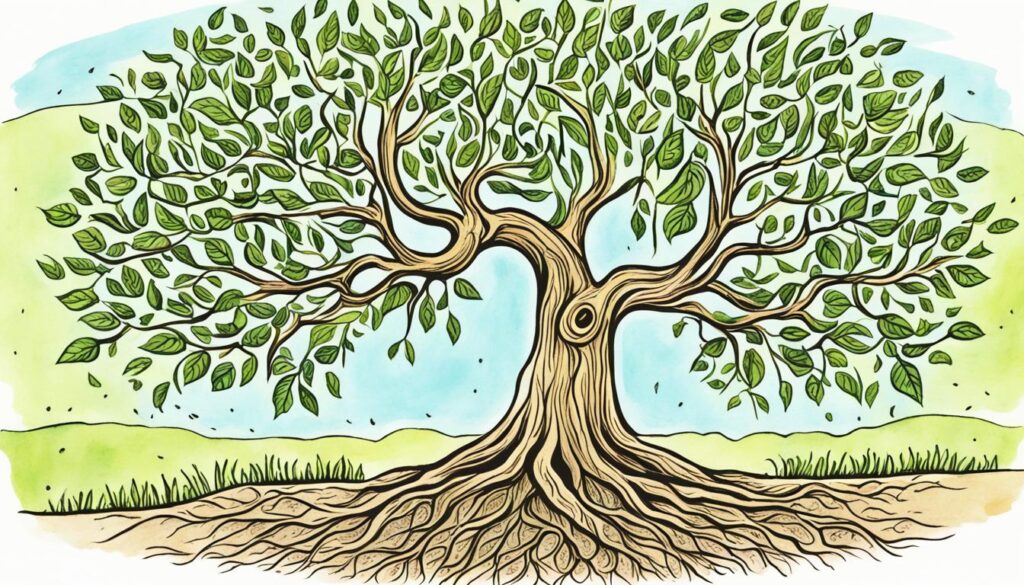“The secret of health for both mind and body is not to mourn for the past, not to worry about the future, or not to anticipate troubles, but to live in the present moment wisely and earnestly.” – Buddha
Dealing with a failed relationship can be one of the most challenging experiences in life. It brings heartbreak, pain, and a sense of loss. However, it is in these moments of darkness that the opportunity for growth and personal development arises. Just as the quote from Buddha suggests, the key to moving forward lies in embracing the present moment and choosing to walk the path of wisdom and earnestness.
In this article, we will explore the power of a growth mindset and the lessons that can be extracted from past failures. We will delve into the role of resilience, empathy, and humility in navigating through a failed relationship. Moreover, we will discuss how failures can be embraced as opportunities for personal and professional growth, and how they can redefine the path toward success.
Key Takeaways:
- View failures as opportunities for growth and development.
- Cultivate a growth mindset that thrives on challenges and sees failure as a stepping stone to success.
- Analyze past failures to identify areas for improvement and prevent future setbacks.
- Build resilience and perseverance to push through adversity and achieve audacious goals.
- Cultivate empathy and humility to strengthen relationships and connect with others who have faced similar setbacks.
The Power of a Growth Mindset
Adopting a growth mindset is a transformative approach that allows you to navigate through failures with resilience, embrace personal and professional development, and learn valuable lessons along the way. Instead of viewing failure as a sign of inadequacy, a growth mindset enables you to perceive it as a stepping stone to growth and improvement. It empowers you to see failure as a necessary part of the journey toward success, rather than a roadblock.
By embracing failure and examining past setbacks, you open yourself up to valuable insights and lessons learned. Each failure becomes an opportunity for self-reflection, introspection, and personal growth. It allows you to identify areas that require improvement, develop new skills, and redefine your path toward success. Through a growth mindset, you cultivate a spirit that thrives on challenges and sees failure as an essential catalyst for growth.
Shifting Perspectives on Failure
Shifting your perspective on failure is a fundamental aspect of embracing a growth mindset. Rather than seeing failure as a personal reflection of your abilities, you recognize it as a natural part of the learning process. Failure becomes an essential ingredient for personal and professional development, highlighting areas that require attention and improvement.
When you adopt a growth mindset, failure becomes an opportunity for growth rather than a source of disappointment. It allows you to step outside of your comfort zone, take calculated risks, and push yourself beyond your limits. By reframing failure as a stepping stone to success, you develop resilience and perseverance, enabling you to overcome adversity and achieve audacious goals.
The Lessons Learned from Failure
Failure is an exceptional teacher. It imparts valuable lessons that can shape your personal and professional journey. When you approach failure with an open mind and a growth mindset, you gain unique insights into your strengths, weaknesses, and areas for improvement.
Examining the lessons learned from failure helps you identify patterns, root causes, and areas for growth. You can extract valuable information to prevent similar failures in the future, making wiser decisions and developing strategies that lead to success. Embracing failure as a necessary part of the learning process allows you to become a lifelong learner, continuously evolving, and thriving amidst challenges.
Remember, failure does not define your worth or abilities. Embrace a growth mindset, adopt a positive perspective on failure, and seize the opportunity to learn, grow, and achieve greatness.
Extracting Lessons and Insights
When faced with failure, it’s natural to feel disappointed and discouraged. However, analyzing past failures can provide valuable insights and pave the way for future success. By reflecting on moments of failure and examining the reasons behind them, you can identify areas for improvement and prevent similar mistakes in the future.
Analyzing failures requires a willingness to learn from your experiences and take an honest look at your actions and decisions. It involves asking yourself tough questions and seeking feedback from others who may have a different perspective. This process of self-reflection and analysis enables you to extract specific lessons learned and create strategies to prevent future failures.
Identifying Areas for Improvement
Identifying areas for improvement starts with acknowledging your mistakes and taking responsibility for them. It requires humility and a growth mindset, allowing you to see failures as opportunities for growth rather than as a reflection of your worth or abilities.
Consider the specific circumstances surrounding your failures and the factors that may have contributed to them. Are there any patterns or recurring themes? Are there skills or knowledge gaps that need to be addressed? By asking these questions and conducting a thorough analysis, you can gain a deeper understanding of the areas where you need to improve.
Preventing Future Failures
Once you have identified the areas for improvement, it’s time to develop strategies to prevent future failures. This involves setting clear goals, creating action plans, and implementing changes based on the lessons learned from your past failures.
Seek advice from mentors or experts in the field who can provide guidance and support. Also, consider seeking additional education or training to acquire new skills that will help you navigate similar challenges in the future.
Remember, failure is not an endpoint but a stepping stone towards success. Embracing failure as a necessary part of the learning process allows you to develop resilience and perseverance. Each failure brings you closer to achieving your goals, as long as you approach it with a growth mindset and a commitment to lifelong learning.

Building Resilience and Perseverance
In life, failure is inevitable. We all face setbacks, challenges, and disappointments along the way. But it’s how we respond to those failures that truly defines us. Building resilience and perseverance is essential for navigating through these tough times and emerging stronger on the other side.
Resilience is the ability to bounce back from adversity and keep moving forward, even when faced with obstacles. It’s about staying focused on your goals and pushing through difficulties, no matter how tough they may be. Perseverance, on the other hand, is the determination to keep going even when things get tough. It’s the mentality that says, “I won’t give up until I reach my goal.”
When we experience failure, it can be tempting to give up and throw in the towel. But that’s where resilience and perseverance come into play. They allow us to overcome failure and continue pushing forward. Failure becomes a stepping stone on the path to success, rather than a roadblock.
Think about some of the most successful people in the world. Elon Musk, Oprah Winfrey, and Walt Disney are just a few examples. They all faced numerous failures and setbacks before achieving their incredible success. But what sets them apart is their ability to persevere and maintain resilience in the face of adversity.
Embracing failure as a learning opportunity is crucial for building resilience and perseverance. It allows us to grow, learn, and become better versions of ourselves. When we fail, we have the chance to reflect on what went wrong, identify areas for improvement, and come back even stronger.
The Power of Overcoming Failure
Overcoming failure is a powerful way to develop resilience and perseverance. It teaches us important life lessons and strengthens our character. When we push through adversity and come out the other side, we build confidence in our abilities and develop a deeper understanding of our own personal strength.
One of the keys to overcoming failure is to stay focused on your goals. When faced with setbacks, it can be easy to lose sight of what you want to achieve. But by maintaining a clear vision and reminding yourself of why you started in the first place, you can find the strength to keep going.
Another important factor in building resilience and perseverance is surrounding yourself with a supportive network of friends, family, and mentors. These are the people who will lift you up when you’re feeling down, provide guidance when you’re unsure of your next steps, and remind you of your own potential.
Failure is not the end of the road. It’s simply a detour on the journey to success. By embracing failure, building resilience, and persevering through challenges, you can overcome any adversity that comes your way. Remember, the path to greatness is rarely a smooth one, but it’s always worth the journey.

Cultivating Empathy and Humility
Failure has a unique way of fostering empathy and humility within us. When we experience setbacks and disappointments, we become more compassionate towards others who have faced similar challenges. Recognizing our own fallibility allows us to connect on a deeper level with those around us, establishing stronger relationships built on understanding and support.
In the context of a failed relationship, cultivating empathy and humility becomes even more important. It is an opportunity to reflect on our own actions and the impact they had on the relationship’s downfall. By acknowledging our mistakes and taking responsibility, we develop a greater sense of empathy towards our former partner and their perspective.
- Empathy allows us to see the situation from their point of view, promoting forgiveness and compassion.
- Humility helps us accept our own role in the relationship’s failure, encouraging personal growth and self-improvement.
- Both empathy and humility facilitate open and honest communication post-breakup, leading to healthier and more constructive conversations.
Moreover, cultivating empathy and humility can extend beyond personal relationships. In a professional setting, these qualities enhance our leadership abilities and facilitate collaboration with colleagues and team members. By understanding and empathizing with the challenges others face, we create a supportive environment that fosters trust, teamwork, and synergy.

The Power of Empathy
Empathy allows us to connect with others on a deeper level and truly understand their emotions and experiences. By putting ourselves in someone else’s shoes, we develop a genuine sense of care and concern, strengthening our bonds with those around us.
The Role of Humility
Humility helps us recognize our limitations and embrace the learning opportunities that failure presents. It reminds us that we are not infallible and that there is always room for growth and improvement. By approaching failures with humility, we become more open to feedback and are better equipped to learn from our mistakes.
| Benefits of Cultivating Empathy and Humility | Ways to Cultivate Empathy and Humility |
|---|---|
|
|
Cultivating empathy and humility is not a one-time effort but an ongoing practice that requires self-awareness and intentionality. By embracing these qualities, we not only enhance our own personal growth but also create an environment of understanding and support for others.
Embracing Growth Opportunities
Failure is not the end; it is merely a stepping stone on the path to success. Embracing failure opens doors to unique opportunities for personal and professional growth. By acknowledging and learning from past failures, you can develop new skills and discover untapped strengths within yourself.
Embracing failure isn’t about dwelling on the negative; it’s about using it as a catalyst for growth. When faced with failure, take a moment to reflect on the experience and the lessons learned. What skills can you develop moving forward? How can you redefine your path toward success?
Embracing failure requires resilience and the willingness to step out of your comfort zone. It is in the face of failure that we often discover our true potential. By pushing past the fear of failure and embracing it as a natural part of the learning process, you can soar to new heights.
Developing new skills is an integral part of personal and professional growth. Failure provides you with the opportunity to reassess your current skill set and identify areas where improvement is needed. Embrace the challenge of acquiring new skills and see failure as a valuable teacher along the way.

Example Table: Skills Developed Through Embracing Failure
| Skill | Description |
|---|---|
| Adaptability | Failure teaches you to adapt to new circumstances and find alternative solutions when faced with challenges. |
| Resilience | Failure allows you to develop resilience, bounce back from setbacks, and maintain a positive attitude despite obstacles. |
| Creativity | Failure stimulates creativity as you find innovative ways to solve problems and overcome obstacles in unique ways. |
| Perseverance | Failure cultivates resilience and perseverance, enabling you to keep pushing forward even when faced with adversity. |
| Problem-solving | Failure enhances your problem-solving skills as you learn from mistakes and find effective solutions to prevent future failures. |
Embracing growth opportunities through failure is a powerful way to redefine your path toward success. It is not a road without challenges, but it is one that ultimately leads to personal and professional fulfillment. So, embrace failure, learn from it, and discover the incredible growth that awaits you on the other side.
Making the Most of Free Time After a Breakup
After a breakup, it’s normal to find yourself with newfound free time. Instead of wallowing in sadness, use this opportunity to embark on a journey of self-reflection and personal growth. Take a moment to evaluate the role you played in the demise of the relationship. Self-reflection allows you to identify patterns, identify areas for improvement, and make positive changes in your life.
One way to make the most of your post-breakup free time is to rediscover your passions and pursue hobbies and interests that may have been neglected during the relationship. Did you once have a love for painting, dancing, or playing a musical instrument? Now is the time to reconnect with those activities that bring you joy.
Engaging in hobbies and interests not only provides a distraction from heartbreak but also allows for personal growth and self-discovery. It opens doors to new experiences, enhances creativity, and boosts self-confidence. Whether it’s joining a sports club, learning a new language, or exploring the great outdoors, the possibilities are endless.
Benefits of Pursuing Hobbies and Interests:
- Reduces stress and anxiety
- Boosts self-esteem and self-worth
- Fosters personal growth and self-discovery
- Provides a sense of fulfillment and happiness
- Creates opportunities to meet like-minded individuals
By utilizing your post-breakup free time to pursue hobbies and interests, you are not only reclaiming your independence but also taking proactive steps towards personal fulfillment. So, go ahead and seize the opportunity to embrace self-reflection, personal growth, and the pursuit of your passions. Embrace this new chapter in your life and carve a path filled with happiness, success, and self-discovery.
Conclusion
Handling disappointment is an inevitable part of life’s journey. It is through these moments of failure and setbacks that we have the opportunity to embrace personal growth. Navigating through failures requires resilience, empathy, and humility.
After a breakup, it can be challenging to move forward. However, by focusing on your personal strengths and accomplishments, you can find the strength to persevere. Use this time as an opportunity to reflect on your own growth and rediscover your passions. Embrace the journey of self-discovery and allow yourself to thrive.
Remember that setbacks and disappointments are not the end of your story. Instead, they are stepping stones towards a brighter future. By choosing to handle failures with grace and a growth mindset, you can pave the way for a fulfilling and successful future. Embrace the lessons learned, the resilience gained, and the personal growth achieved. Move forward with confidence, knowing that every failure is an opportunity for personal transformation and a chance to create a life filled with joy and fulfillment.
FAQ
How can I move on after a failed relationship?
Moving on after a failed relationship can be challenging, but it is possible. It’s important to embrace the opportunity for personal growth and see the breakup as a chance to redefine your path toward happiness. Take time for self-reflection, focus on your strengths, and engage in activities that bring you joy.
How do I cope with heartbreak?
Coping with heartbreak takes time and patience. Allow yourself to grieve and feel your emotions, but also remember to take care of yourself. Surround yourself with supportive friends and family, engage in self-care activities, and consider seeking professional help if needed.
How can I heal from a failed relationship?
Healing from a failed relationship is a personal journey. Give yourself permission to heal at your own pace and be kind to yourself. Focus on self-care, seek support from loved ones, and consider engaging in activities that promote healing, such as therapy, journaling, or engaging in new hobbies.
What are the signs of a toxic relationship?
Signs of a toxic relationship include lack of trust, constant criticism, controlling behavior, lack of respect, and emotional or physical abuse. If you’re experiencing any of these signs, it may be necessary to evaluate the relationship and consider ending it for your own well-being.
How can I rebuild trust after a breakup?
Rebuilding trust after a breakup takes time and effort from both parties involved. It’s important to have open and honest communication, set boundaries, and make a commitment to work on the issues that led to the breakup. Trust can be rebuilt through consistent actions, transparency, and forgiveness.
How do I let go of a past relationship?
Letting go of a past relationship can be difficult, but it is essential for personal growth. Focus on accepting the situation, grieving the loss, and allowing yourself to move forward. Engage in self-care activities, surround yourself with positive influences, and remind yourself of your worth and the possibilities that lie ahead.
How can I navigate through a failed relationship?
Navigating through a failed relationship requires resilience and perseverance. It’s important to acknowledge your emotions, learn from the experience, and focus on personal growth. Surround yourself with a support system, set goals for yourself, and remind yourself of your strength and resilience through challenging times.
What are some tips for handling disappointment and failure?
Handling disappointment and failure requires a growth mindset. Embrace failure as a stepping stone to growth and improvement rather than a reflection of personal inadequacy. Take the time to reflect on the failure, extract lessons learned, and develop strategies to prevent similar failures in the future. Cultivate resilience, empathy, and humility to navigate through setbacks and emerge stronger than before.

